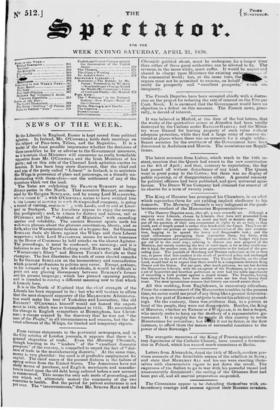The King of Hanover has prorogued his Chambers, in an
edict which reproaches them for not yielding implicit obedience to his demands. The Morning Chronicle is very indignant at the pusil- lanimous conduct of the Hanoverian Representatives— "The Hanover Deputies seem, after all, a very cowardly set. Although a majority wele Liberals, chosen by Liberals, they have still proceeded trom the first with the determination to avoid any bold or decisive step. They put off the question of their own competence or right to sit as long ro. they could, and at length passed it rather than break with the Court. They hive de- ferred, under one pretext or another, the con,i,leratimi of the new constitu- tion, begging to be spared the heavy awl disagreeable task ; and the royal ordonnance proroguing them reproaches them, but fairly, with their tergiversation and pusillanimity. The question of the budget they have got rid of in the same way ; refusing to discuss any new proposal of the Ministry, and merely rendering the levy of taxes legal, as far u they could ren- der it legal, for another year, in the same proportious as the budget of the pre- ceding year. The journals of Hamburg and Bremen endeavour, as far as they can, to prove that this conduct is the result of profound policy and unchanged Liberalism on the part of the Hanoverian& The Ca.5sel Gazette, on the other hand, would lead us to expect that there would be a compromise between King Ernest and the States. kor our part, after much patience, we can but declare the Hanoverian Liberals, with the exception of the Professors, to be as arrant a set of hypocrites and heartless politicians as ever had the noble opportunity of recording a bold protest against a stupid tyrant. The Deputies, having been elected by Liberals, have done neither more nor less than betray their trust. The most ignominious censure that history can record awaits them."
All this scolding, from Englishmen, is excessively ridiculous. From the commencement of the Hanoverian troubles to the present time, we never could see proof of any thing like a general determina- tion on the part of ERNEST'S subjects to resist his arbitrary proceed- ings. On the contrary, there was evidence that, to a portion at least of the people, they were not disagretsable. Besides, the King of Hanover, whether an ERNEST or a Wi ht.laibt, is in fact a despot, who merely seeks to keep up the thockery of a representative go- vernment. It is mighty fine fur pie id this country to revile Hanoverians for cowardice; but Wald it not be fairer, in the first instance, to afford them the means of successful resistance to the power of their Sovereign ?






















